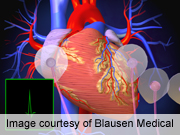
FRIDAY, Sept. 7 (HealthDay News) — Patients with atrial fibrillation — a heart rhythm disorder — are increasingly aware of the link between their condition and the increased risk of stroke, according to a recent survey.
Atrial fibrillation is a quivering or irregular heartbeat that affects about 2.7 million people in the United States.
A 2011 survey of more than 500 people with atrial fibrillation found that half of them were unaware they had a fivefold increased risk of suffering a stroke. But the more recent American Heart Association/American Stroke Association 2012 poll of 500 people with atrial fibrillation found that 64 percent knew about this level of increased stroke risk.
The improved awareness “is a great step in the right direction,” association spokesperson Dr. Patrick Ellinor, associate professor at Harvard Medical School and a cardiologist at Massachusetts General Hospital in Boston, said in an AHA/ASA news release.
“The American Heart Association/American Stroke Association works to provide health care providers, patients and caregivers the educational tools and resources they need on this very important topic,” Ellinor added. “We hope to report a higher percentage annually until we reach 100 percent.”
The 2012 survey also found that 82 percent of respondents believe having atrial fibrillation increases their stroke risk, compared with 75 percent in the 2011 survey.
Many atrial fibrillation patients rely on their health care providers for information about their condition and education about its health risks, the release noted. The recent survey found that two-thirds of patients have discussed their risk for stroke with their health care provider, but only about one-third were told they are at high risk for stroke.
More information
The U.S. National Heart, Lung, and Blood Institute has more about atrial fibrillation.

